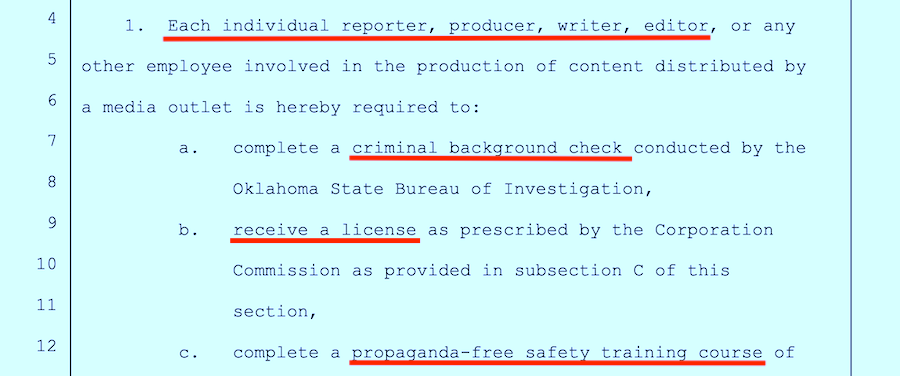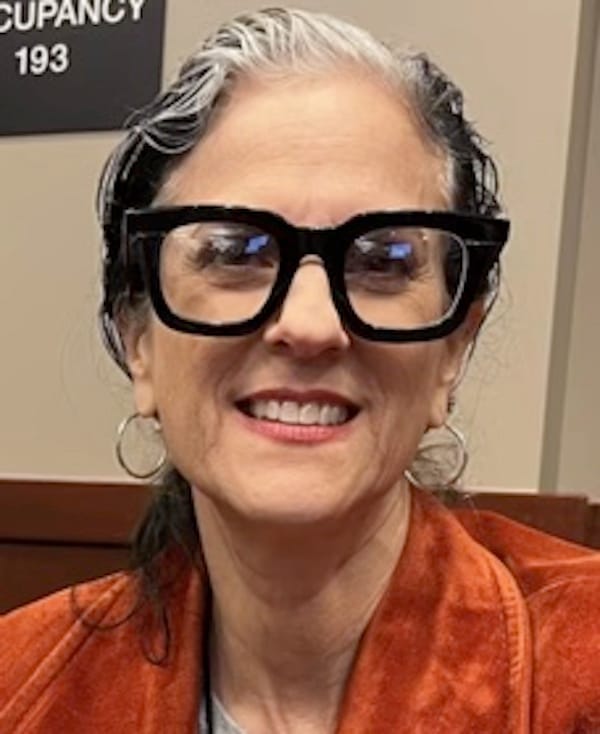When Your Local Government Tries to Gag You
“They seem bound and determined to put obstacles in my way."

By Alice Dreger
This past week, Tulsa Public Radio reported Oklahoma State Senator Nathan Dahm has put forth a bill to discourage us pesky reporters. It’s a doozy.
If enacted as written, the law would require media companies’ employees to submit to criminal background checks, be drug-tested quarterly, take “‘propaganda-free’ safety training, and get a million dollars in liability insurance. Individual journalists would have to get licenses and “media outlets would also need to pay $250,000 for a license every year and obtain $50 million liability insurance.”
That annual fee exceeds a lot of our organizations’ annual budgets. But there’s more. Dahm wants journalism labeled like cigarettes. He dreams that every reported story delivered in text or video will contain this:
“WARNING: THIS ENTITY IS KNOWN TO PROVIDE PROPAGANDA. CONSUMING PROPAGANDA MAY BE DETRIMENTAL TO YOUR HEALTH AND HEALTH OF THE REPUBLIC.”
Poor Senator Dahm must have had some really bad experience with the media to go all nuclear. Unfortunately, his attempts to pass regulations on our work are not unique.
Just ask Norine Dworkin, founder and editor in chief of VoxPopuli, a local news outlet covering the reddish lands of Winter Garden, Ocoee, Oakland, and Windermere, near Orlando, Florida.
“They’re not used to having any kind of accountability here,” Dworkin explained in a Zoom interview on Jan. 24. “They’re used to having a local publication [whose] big story is the Dairy Queen is opening.” (She’s not kidding.)
By contrast, Dworkin has put the Winter Garden government under a spotlight.
She has bugged the mayor for responses to a visit from NeoNazis, reported on protests against the elected City Commission, asked why the city put more effort into celebrating Christmas than Chanukah, and covered citizen actions like a recent rally for Gaza organized by the Florida Palestine Network. She works hard to bring serious, balanced news.
But Dworkin’s pointed questions to the Winter Garden government about current events resulted in the City Commission passing a resolution about a year ago laying out special “rules of conduct for the media.”
These include that “The Mayor/Commissioner, Commissioners, and other City officials should not be followed, heckled, or harassed before, during, or after Commission meetings to request interviews, to obtain comments or to respond to questions.”
The rules enacted by Winter Garden’s commission also specify that journalists cannot use the “public comment” portion of the meeting like other citizens. Reporters are forbidden from getting up and asking a question during public comment.
Dworkin explained to me it’s all directed at her, as she’s typically the only serious reporter in the room and she has resorted to asking questions during public comment. She’s tried to get answers the more conventional ways – emails, phone calls – but often can’t get anyone even to acknowledge she’s asked a question.
“They seem bound and determined to put obstacles in my way,” she told me.
Speaking at public comment puts the questions clearly on the public record.

“They’re going to have to be accountable and they’re going to have to not answer my question in a room full of people,” if that’s what they want to do. “Our jobs are to get these [public officials] to give us answers.”
Recognizing that sunlight is the best disinfectant, when the commission threatened last summer to prosecute her for speaking during public comment, Dworkin contacted the big paper in the area – the Orlando Sentinel – which picked up the story.
Only one city commissioner responded to the Sentinel’s questions, namely Ron Mueller, who said he had checked the idea with members of the media “he was familiar with” and heard back no complaints. Uh huh.
Of course, one upside of dealing with oppression for being a journalist is that other journalists tend to be interested in your story. Dworkin definitely found that to be the case, receiving help in this matter not just from the Sentinel but also from the Society of Professional Journalists.
Florida’s First Amendment Foundation also helped with a five-page communication to Winter Garden, reviewing the facts and “respectfully request[ing] that the Winter Garden City Commission comply with the requirements of [the] U.S. Constitution and refrain from any further action in regard to enforcement of this resolution.”
Dworkin told me that FIRE, the Foundation for Individual Rights and Expression, also offered assistance in the event the resolution leads to legal action against her. (Disclosure: I have been a paid keynote speaker for FIRE.)
It won’t be any surprise to folks in this industry that Dworkin found things got better once there was press reporting (beyond her own) of her case.
“Since the media coverage [last summer], we have this detente,” she says. “The law exists, but I’m doing my job without further threats of banning.”
Still, no reporter should have to face these kinds of struggles to do their job.
Keep in mind that if you find yourself in a similar situation, besides the organizations named above, help may be available through the Reporters Committee for Freedom of the Press and Lawyers for Reporters.
And don’t underestimate the power of letting your readers in on challenges you’re facing. Sharing your struggles (example here) can result in moral and financial support, and a critical benefit of local reporting is improved media literacy, including educating your audience about governmental transparency laws and press freedoms.
Alice Dreger is a journalist, historian, and the publisher of Local News Blues. She founded East Lansing Info, a nonprofit digital investigative news service, and ran the operation for about ten years. Read more at the Local News Blues contributors page.





